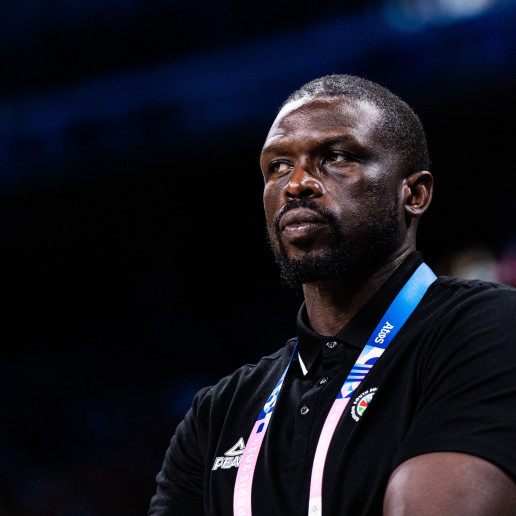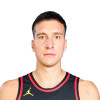South Sudan Basketball Federation President Luol Deng believes that the absence of African referees at the Olympics results in a different standard of officiating, as these refs may not be accustomed to the physicality of African players. Deng pointed out the disparity in free throws, noting that South Sudan managed only six attempts compared to Serbia’s 31, suggesting that this imbalance highlights a broader issue.
Luol Deng stood off to the side, watching as Royal Ivey voiced his frustration amid a sea of media following South Sudan's loss to Serbia, a defeat that eliminated them from the Olympic Games, 85-96.
| Player of the Game | |

|
EFF
36
|
| Bogdan Bogdanovic | |
| Points | 30 |
| Accuracy | 10-14 |
| Rebounds | 4 |
| Assists | 8 |
When the president of the South Sudan Basketball Federation took the microphone, he called for greater respect toward the African basketball region.
"I thought Royal said a lot that I agree with. I've been a part of a lot of games. You know, my whole career, coaching for the last 3.5 years, I thought it was deliberate blatantly. We couldn't be as aggressive as they are," Deng stated.
"I know that Serbia is known for basketball. They've been great for many years. The way the guards play, it's almost like the ref knows them. So it's okay for the refs if they know certain players, to let them play their style. As soon as our guys play their style, we get fed every time. It's almost like there's a narrative and a stigma out there that African players are aggressive," he added.
"I don't know why there are no African referees in the Olympics. It is 2024. Well, I don't know what's the reason for that? You could say whatever you wanna say. But you know, if we're representing the continent, we gotta be represented fully. And that's something that we gotta keep on working on. But if these referees are not familiar with our game or our style, then I don't know what the World Cup or the Olympics is. Is it just a European basketball style? And we're not allowed to be aggressive?"
Serbia attempted 31 free throws, sinking 21 of them, while South Sudan managed just 6 free throw attempts, hitting 5.
This disparity drove South Sudan head coach Royal Ivey to return to the flash interview zone with a stat sheet, after initially blasting the media availability and making a hasty exit following a brief comment.
South Sudan stayed within a narrow distance of Serbia for most of the game, trailing by just a single point as the fourth quarter began.
"I thought there's no way we shoot six free throws in a game that's just as physical as that. There's no way that if anyone watches that game, they're matching our physicality, and we're in a bonus in 3-4 minutes. Yeah, you could say that we are aggressive but they're aggressive too. If you wanna call it both ways, they can't be pressing us in the backcourt, pushing our guys. That's what happened the whole game, and that's what Serbia does, and they get away with it because they're known for it," Deng said.
"So just come out there and say, ok, we don't know South Sudanese basketball. If that's the case, then yeah, then, okay. But if I'm saying anything that's not true, I challenge anyone here to run the tape back and sit down and count every foul. It's not the same aggressiveness," Deng concluded.
South Sudan attempted 34 three-pointers, 13 more than Serbia, indicating a focus on perimeter offense.
Both teams took 44 two-point shots, with Serbia outscoring South Sudan by four points in the paint (38-34).
Serbia received 17 personal fouls, six fewer than South Sudan.
"The refs are calling a technical on my coach when the Serbia coach is halfway half-court chasing the ref, and nothing is being called then. What are we supposed to do? And I'm not making any excuses. Our guys did play hard. Yes, you could say that Serbia is a better team than us. They are ranked higher than us. I give them all the respect. But if that game is fair right there, we have a better chance of that," Deng added.
"I'm not gonna hold back because I'm not happy with it and I'm not here to make excuses. We're gonna keep on working, and I guarantee you we'll be back, and we're gonna be better. It's a game that takes a lot of work. We're only 3.5 years in, we know that, but we're not just here to just to be a showcase. We deserve to be here. We're a good team and I don't think it was fair tonight," Deng admitted.
He firmly reiterated that he has no racial allegations but emphasized the need to understand stylistic differences and maintain consistency in officiating on both sides.
"I'm just representing the continent. That's all races in our continent. I'm not here to be any racial or anything. I'm just saying that we're not allowed to be as aggressive, and I think the refs are familiar with their style of play, and they allow them to play their style, and we're not allowed to match that style. That's all I'm saying," Deng clarified.
To clarify, there is one African referee in the competition: Yann Davidson from Madagascar.
Davidson, a FIBA referee for 11 years, has mostly worked in the third French men's basketball division. He was appointed to officiate the women’s basketball tournament game between Serbia and Puerto Rico lat Sunday.
At 33 years old, Davidson moved from Madagascar to France 20 years ago.
What needs to change for the next tournament for South Sudan to feel that they are getting fair treatment?
"There's a lot that needs to change. We gotta get better as a team. We gotta keep on working, we gotta keep on building. We have a direction that we're trying to get to. You know, we're not here just to show up, and that's the end of it. We've put in a lot of work. These guys have put in a lot of work. They played hard, they deserve better. But I think, you know, if this is the world stage, you gotta recognize all type of basketball. If you're not familiar with our guys, let the refs sit down and watch these guys play and see how they play. It seems like, you know, they're familiar with everybody else's game."
"This is not something that I'm just making up, everybody knows it's a huge disrespect to African basketball, but at the same time, we got to develop basketball in the continent. We gotta bring facilities and develop our refs, coaches, and so on. We know that. But also, there's a mindset of African style and African basketball, and it showed completely. I'm not here to just make excuses, everybody knows that. But you know, as a continent itself, as Africans, we gotta do better in developing our game and giving a platform for our players to keep excelling and that's what we're trying to do."
South Sudan, a nation that entered major FIBA competitions only three years ago, has had a notable journey since regaining independence in 2011. In their debut Olympic appearance, they secured one win in three games.
They defeated Puerto Rico, faced a tough challenge from the USA, and ultimately lost a crucial match against Serbia.
Finishing third in their group, South Sudan had the worst point differential compared to the other third-place teams and, as a result, did not advance to the quarterfinals as one of the top two third-seeded teams.
"Overall, I'm proud of my guys. I'm proud of the federation. I'm proud of South Sudan. I'm proud of our fans, I'm proud of the continent. This took a whole effort," Deng was about to conclude his speech.
"We were practicing in Rwanda. We've been in different countries and we thank everybody that's been able to help us out. So it was a group effort. We showed a way of how to build the basketball going forward. And I think that the rest of the continent and the rest of the countries will follow," Deng added.
"If FIBA looks at that African side as just, you know, let's just please everybody, that's not why we're here. We're here to compete fairly and to move forward with the result."
"We appreciate all the love," the former NBA player said, thanking the South Sudanese people and new fans from all over the world.
"Everybody's been desperate for it. There are a lot of people who support and do great work to elevate the game. You can see African athletes can reach the highest and compete for their countries. It's happening in all sports where a lot of African countries, a lot of African players are playing for other countries. And we have to keep on developing and changing that narrative and put it out there. So I'm really happy with the support. I know that a lot of people are excited to see that, and hopefully, that will continue, and that will capture other people to do some of the things."





















































